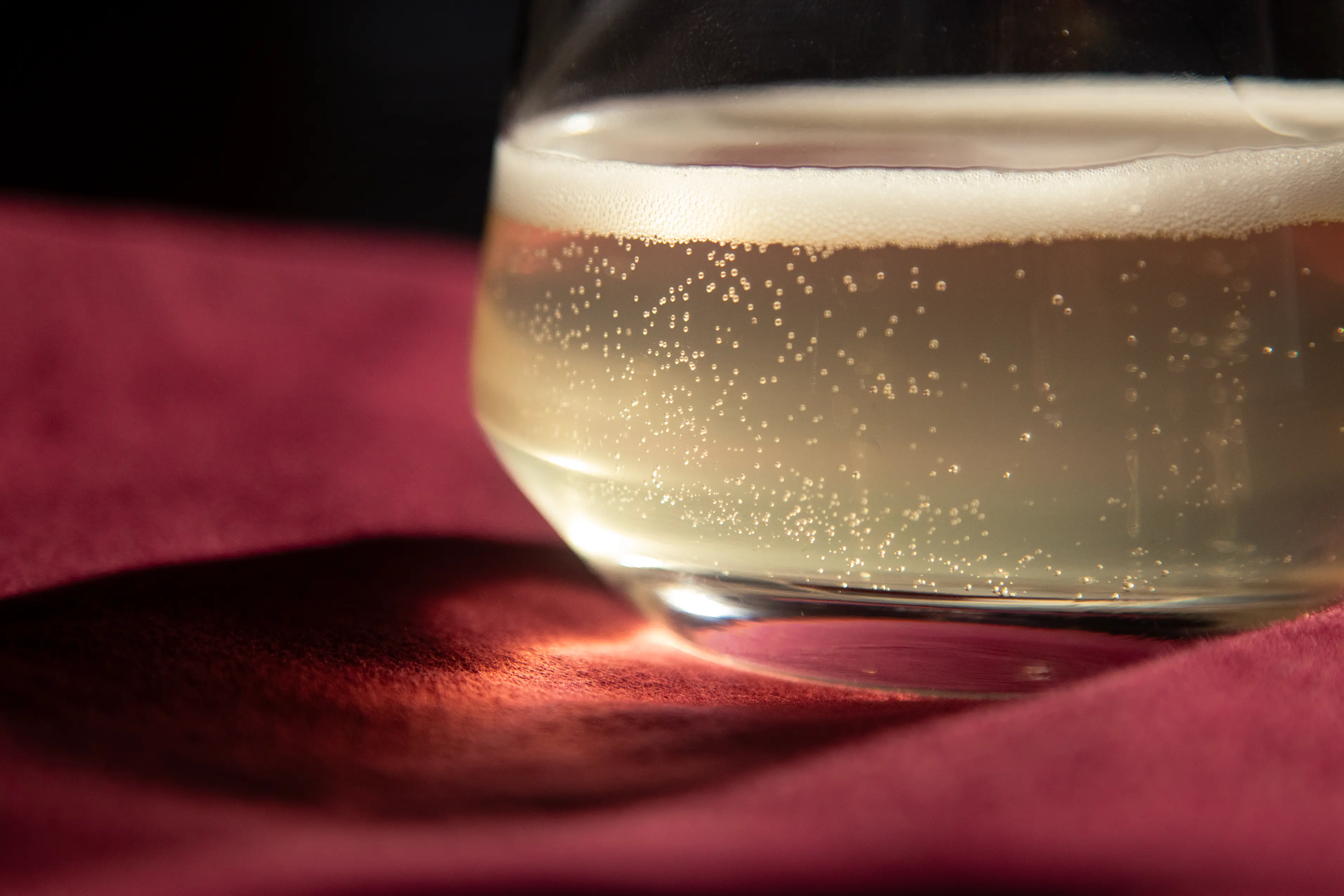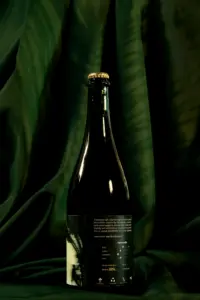
Sparkling palm wine
From Africa to Sri Lanka, India to the Caribbean, wherever palm trees grow, their sap has been harvested for millennia to create an ancient and elusive elixir: palm wine.
The process of tapping palms to produce this drink approximates magic—turning water into wine, so to speak. Once harvested from towering palm trees, the sap ferments spontaneously, producing a low-alcohol, cloudy and effervescent beverage.
Although palm wine is largely unknown in the U.S., Onye Ahanotu, a trailblazing Nigerian-American hailing from Sonoma County, is on a mission to change that. As Ahanotu observes, “Palm wine is a really, really old category… there’s evidence certain pharaohs used palm wine in their embalming process.” While the precise origins of palm wine remain unclear, historians believe that humans have been fermenting palm sap into alcohol since around 16,000 BCE, making it one of the oldest-known fermented drinks—predating grape wine production by a staggering 10,000 years.

What makes palm wine so unique is that it is nearly ready to drink as soon as it comes out of the tree. Palm wine ferments spontaneously once the sap begins to interact with yeasts present in the air and environment. The resulting beverage is a milky, hazy color with a light effervescence: typically foamy, sweet with tart notes, fruity and floral. The sap of several palm species can be used to produce palm wine, including raffia palms, coconut palms, date palms and oil palms. In West Africa, different ethnic groups have preferences for particular palm species when it comes to palm wine. In South India, palm wine—known as toddy—is a popular, workingman’s beverage sold in so-called toddy shops.
“Tappers” or “toddy tappers” are the skilled individuals who climb palm trees, often with the aid of ropes or ladders, to harvest palm sap. They make a cut in the crown of the palm and leave vessels, such as gourds, plastic bottles or jars, attached to the tree to catch the sap, returning after several hours to collect the harvest. Thanks to the high sugar content of the sap, fermentation begins almost instantaneously. Like natural wine, palm wine is a simple, unadulterated product with just one ingredient: palm sap. The naturally occurring yeasts in the environment quickly transform the sugars in the sap into alcohol. Within as little as two hours, the sap ferments into a beverage with an alcohol content of around 3.3-5% ABV. But this fermentation process is swift, and the wine begins to sour within a day or two, turning into vinegar. The fleeting nature gives palm wine a very short window in which it can be enjoyed and renders its shelf life relatively non-existent.

Onye Ahanotu, a natural-born problem-solver, has set out to change this, asking himself the question, how can the essence of Nigerian celebration be captured in a stable product that can be enjoyed in the U.S.? The quest led the 37-year-old Rancho Cotate High grad to launch Ikenga Wines, a project that merges science, technology, food, art and culture. As far as he knows, he is the first to attempt such a feat.
Growing up in Rohnert Park with a Nigerian father, Ahanotu observed the wine industry boom while also developing deep connections to his Nigerian roots, primarily through food and cooking. When it came time to venture off to college, torn between art and science, Ahanotu opted to study material and chemical engineering at UC Irvine. “Throughout my life, I was curious about how things work and how you can design things better,” he recalls. It was during this period that he also began exploring the ties between food and chemistry, drawing particular inspiration from Alton Brown’s cooking show Good Eats.
Ahanotu ‘s academic journey continued at the University of Michigan and later Harvard, where he focused on next-generation environmental technologies and food sciences. But, along the way, he never let go of his artistic pursuits, starting with drawing and painting before venturing into digital photography. Eventually, he expanded his creative oeuvre to include multimedia pieces, producing large-scale audio-visual projects such as “Urban Forest Bathing,” a project that offers an alternative experience of Oakland through generative soundscapes, images and time-lapses.
In 2020, Ahanotu launched Ikenga Wines, blending his myriad passions—science, engineering, food, and art. “Sometimes, what I do is more on the technical side, sometimes it’s more artistic, sometimes it’s a blend,” he explains. “With Ikenga Wines, I feel like it is an attempt to fully blend them.” He set out impassioned to combine science and art to create a sustainable product with soul. Drawing on his background in technology and food science, Ahanotu first turned to his father’s hometown in Nigeria to explore palm wine production. He tried bottling and preserving traditional palm wine from Nigeria for export, but several challenges emerged off the bat. The fermentation process proved too unpredictable, with some bottles overly sweet, others not sweet enough, and others developing undesirable, off flavors. Moreover, the environmental impact of palm wine production, which often involves deforestation, was a major deterrent.
As an engineer committed to sustainability, Ahanotu knew he had to find a more innovative solution. Rather than simply following the traditional route, he approached palm wine production much like a winemaker would approach crafting a cuveé—applying unique skills and knowledge to impart a distinct flavor and experience to each bottling. In so doing, he sees himself as the first-ever “palm winemaker,” refining and redefining the ancient beverage with his own expressions.
To achieve this vision, Ahanotu pioneered a new method of creating palm wine by synthesizing a molecular version of palm sap, sourced from plant-based components instead of directly from palm trees. He also collected naturally occurring yeast from palm wine ferments in Nigeria with which to ferment this molecular sap. Ahanotu equates this innovative approach to the process of creating synthetic diamonds—engineering the molecular components rather than extracting them from nature.
In blending science and culture, Ahanotu has redefined what palm wine is and can be, transforming this ancient, ephemeral drink into something new, sustainable and uniquely his own. Still in the early stages of production, Ikenga Wines, with a production facility in Berkeley (where Ahanotu now resides), just recently received its required licenses and is now focused on scaling up. Unlike traditional palm wine, Ahanotu employs méthode ancestral to produce his bottles. With this ancient method of sparkling wine production, that has become trendy in recent years championed by natural wine producers, wine is bottled before the end of its primary fermentation, allowing the fermentation to finish in the bottle, trapping CO2 and creating natural bubbles.
For now, Ikenga Wines is focused on one core product, Traditional-ish, with two key expressions: Gold and Red. The Gold bottling is a delicate, off-dry interpretation of West African palm wine while the Red is a bolder, sweeter beverage, held in balance by a refreshing tartness. Both wines explore flavors of tropical fruit and drupe fruits native to West Africa such as udara (African star apple), guava and soursop. Unlike traditional palm wine, these bottles clock in around 9-12% ABV, approximating the alcohol level of sparkling grape wines.
Beyond these two bottlings, Ikenga offers a Palm Wine Club subscription where members receive exclusive, experimental bottlings. The Palm Wine Club is Ahanotu’s playground for exploring what his creations can be, uncovering new flavors and techniques. You can purchase palm wine and join the Palm Wine Club via its website (ikengawines.com). Ikenga Wines is in the early stages of getting local distribution around Northern California, so also keep an eye out for palm wine in shops and restaurants in the near future.

Onye Ahanotu’s journey to introduce palm wine to the American market showcases an intersection of tradition, innovation and sustainability. By blending his engineering background, ancestral roots and artistic practice, Ahanotu has created a new representation of this ancient beverage, elevating it to meet modern sensibilities while preserving its cultural significance. His approach ensures that palm wine can be enjoyed in a stable, sustainable form without sacrificing the essence of its original flavors. Through Ikenga Wines, Ahanotu not only brings a taste of Nigerian culture and celebration to the U.S., he also pioneers a new method of crafting sparkling palm wine that mirrors the traditional techniques of grape wine production.
Ahanotu’s commitment to innovation, paired with his respect for tradition, allows palm wine to evolve into a globally appreciated beverage, accessible to both the Nigerian diaspora and those seeking to try unique, handcrafted beverages. As Ikenga Wines grows, it holds the potential to transform palm wine from a fleeting, regional delicacy into a celebrated, sustainable drink enjoyed the world over.



